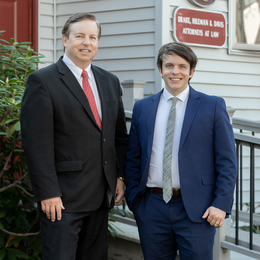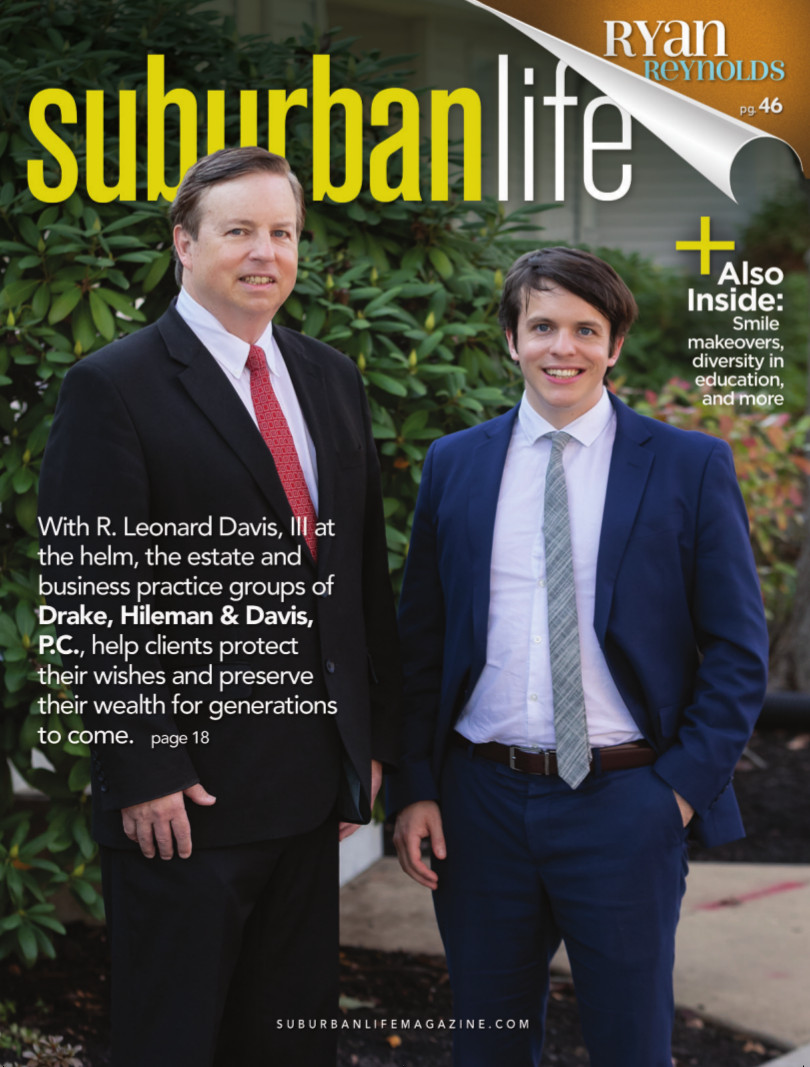
Plan, Preserve, and Protect
With R. Leonard Davis, III at the helm, the estate and business practice groups of Drake, Hileman & Davis, P.C., help clients protect their wishes and preserve their wealth for generations to come.
When is the best time to draw up a will? When one marries? When one has children? When one assumes a certain degree of wealth? Upon retirement? R. Leonard Davis, III, who leads the estate and business practice groups at Drake, Hileman & Davis, P.C., believes the younger you are when you make a will, the better.
“Planning should be done when you’re well, not when you get sick or are too old,” Davis says. “Let’s say you’re 21 years old. That’s not too soon to begin thinking about estate planning. Young people should plan early. Parents who are doing their own planning should talk to their children about a will. For people in their 20s, that’s by far the best way for them to hear about it.”
In the United States, 55 percent of people die without a will or estate plan, and nearly 72 percent don’t have an up-to-date will. Dying without a will is a condition known as “intestacy” and means that the intestacy laws of their state will determine how and to whom their property is distributed, including bank accounts, securities, real estate, and other assets they own at the time of death.
“It’s not the worst thing that can happen if you die without a will,” Davis adds. “But if you don’t have a will, you’ve made your estate more complicated and expensive for your loved ones. Without a will, how your estate gets distributed to loved ones and maybe minor children is decided by somebody else. A judge gets involved, and there may be conflicting claims. Eventually it will be straightened out, but in the meantime it can be a mess. The half of Americans that have wills see the value in estate planning. And if they see it for themselves, they’ll see it for their children.”
Drake, Hileman & Davis, P.C. is a full-service, general practice law firm serving clients throughout eastern Pennsylvania. Davis joined the law firm in 1986. His primary practice areas are estate planning, including wills and trusts, charitable and gift planning, elder law, and estate and trust administration, as well as helping clients form business entities such as corporations and LLCs, business and real estate transactions, and business succession planning.
“It’s a feeling of satisfaction when you can help people,” Davis says. “That’s one of the reasons I went into law. People get excited about saving money or taxes for their heirs and I get a kick out of that, too.”
Estate planning involves wills; trusts of all kinds, including revocable and irrevocable, testamentary and living; general durable powers of attorney and durable healthcare powers of attorney; asset protection planning; special needs trusts for underage and incapacitated individuals; charitable gift planning; foundations; life insurance planning; tax reduction strategies including federal estate tax planning; and nursing home and Medicaid eligibility planning.
“Estate planning addresses what happens to a client’s assets when they die or become incapacitated or ill and can’t manage their money or assets,” Davis says. “It addresses who will take care of them. Wills are the starting point. But for those with larger, complicated estates, they may graduate from a will to a trust. There are many types of trusts in a lawyer’s toolbox.”
Davis says that some people mistakenly assume estate planning is only for the very wealthy. In truth, anyone with a family, a home, and/or any kind of financial assets should have an estate plan. When done properly, an estate plan can help individuals resolve everything from designating a guardian for children to passing on a family-owned small business and mitigating intra-family conflicts.
Davis’ areas of expertise also include estate administration, or the process of collecting and managing one’s estate, paying debts and taxes, and distributing the remaining property to the heirs of the estate, as well as business succession planning. This sort of planning is for small or family-owned businesses of all types, especially entrepreneurial businesses.
“So often, when the founder dies or retires, the business is unable to survive,” Davis says. “This outcome can be avoided with careful planning. We help the business to survive and thrive over multiple generations by use of shareholder and buy-sell agreements, employment agreements, incentive programs for successors, identifying triggering events, and helping the client to deal with the same in the most effective and efficient manner. My job is to protect the retiring founder while incentivizing the future owners.”
Davis also focuses on elder law, dealing with the myriad of issues that affect the aging population. This area of law helps prepare the elderly person and his or her spouse for financial freedom through proper financial planning and long-term care options.
“Seniors should be thinking about retirement homes and, potentially, nursing homes,” Davis says. “We try to qualify people for Medicaid and preserve an inheritance for their children and grandchildren. We help clients maximize their retirement assets and Social Security benefits. You can’t do elder law planning in a vacuum. You must include income and asset planning.”
Davis received his law degree from Villanova University School of Law in 1980. He was associate editor of the Villanova Law Review, in which he had both a comment and a case note published. Prior to joining Drake, Hileman & Davis, he worked as a senior associate in Mellon Bank’s legal department, where he drafted commercial and consumer loan documents for use throughout the Commonwealth. Earlier he was an associate with the Philadelphia law firm of Drinker Biddle & Reath, serving in the banking, bankruptcy, and corporate departments.
Now, 34 years after Davis joined the firm, his son, Raymond, has joined Drake, Hileman & Davis as an associate after working there as a part-time law clerk for four years. Raymond is also a trained fine artist, sharing his father’s love for art.
“I’m mentoring my son to take over my practice someday,” Davis says. “He grew up knowing about the firm because I talked about it daily. He understands the practice and our clients. His personality is a lot like mine. We both like helping people. He worked with me for four summers during college and law school, learning the ropes before he became a lawyer. He knows how to draft wills and trusts. He’s been a perfect fit.”
Although he has begun planning for the firm’s future, Davis has no intention of going anywhere anytime soon. He still derives great pleasure from helping clients manage their lives.
“Helping people, and seeing them realize they’ve been helped, is very satisfying,” he says. “And knowing we not only helped make their life easier, but also established a better future for their children and grandchildren, and provided for charities they care about is an indescribable feeling.”
For more information on the law firm of Drake, Hileman & Davis, P.C., including addresses for its offices in Allentown, Bethlehem, Doylestown, Easton, and Stroudsburg, call (215) 348-2088 or visit www.dhdlaw.com.
Photograph by Nina Lea Photography
Published (and copyrighted) in Suburban Life magazine, November 2020.



